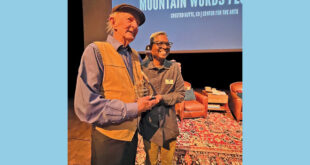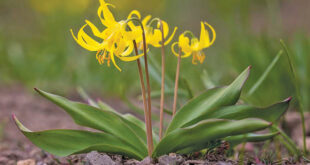“It’s a win-win-win”
By Seth Mensing, WCU
A warm fall breeze pushed the smell of freshly turned earth out over the rows of wilted peas and cabbage in the garden beside Gunnison Community School. Kyra Kidd stooped over a thick patch of thistles and pulled. “Ah!” she yelled. “It pokes you.”
Kidd, a Western Colorado University sophomore and middle blocker on the Mountaineer volleyball team, was just one of the 50 or so student-athletes, coaches and staff who came out to Mountain Roots’ Living Classroom at Gunnison Community School on Thursday, October 24 to prepare the community garden for the growing season to come. For her, it was an opportunity to get off campus and dig her hands in the dirt. But it was also an opportunity to make a meaningful impact on her adopted hometown.
This year, Mountaineer Athletics partnered with Gunnison-based Mountain Roots Food Project to lend a helping hand as the organization prepares for winter. For the last 14 years, Mountain Roots has grown fresh produce on small plots throughout the Gunnison Valley for delivery to people in need. Last year, volunteers worked 414 hours in the gardens to produce 1,500 pounds of food for more than 300 households.
As essential and satisfying as the work is, it’s equally labor-intensive. Mountain Roots has eight outdoor gardens (plus four shipping containers outfitted for hydroponic gardening) throughout the Gunnison Valley that all need to be planted, watered, weeded, pruned, harvested, and winterized in the fall to ensure the soil is ready for seeds in the spring.
When Mountain Roots development director Rudy Germany learned that his colleague, director of youth education Kristen Aaltonen, is married to Western’s women’s soccer head coach Joshua Alcala, he saw an opportunity to create Athletes-4-Agriculture.
“This is an opportunity to connect the ‘non-ag’ student-athletes to the land and to their community,” Germany said. “The Western coaches were looking for things for the kids to do as team building exercises and double as community engagement. We were very happy to have the help in the garden. This has been just an incredible opportunity for everyone. Just look around, we have 50 kids here. It’s actually starting to resonate.”
All around him, students laughed and worked together to coil irrigation hoses, pull weeds, supplement the soil, and build new paths between garden beds. It was the second time this year student-athletes had turned out to help Mountain Roots close a garden, and another event was planned for the following Monday.
But before students ever stepped foot in the garden, Germany had to pass the idea by Que Semien, compliance coordinator for Western Athletics. She could have said no, that the work was outside the scope of what a coach could ask a player to do. Instead, she thought it was a great opportunity to get involved with the community and contribute to an organization that provided so much food to families in need.
“This allows everyone to get out of their heads and their sports. It gets intense, it gets serious. But we’re also a community over here, laughing and pulling weeds,” Semien said. “It helps them get involved with the community and feel like they’re doing something. It’s not just practice, and it’s not just games. You live here, so you’re a part of this.”
In addition to being a source of food for families across the Gunnison Valley, the gardens are also a “living classroom” where Mountain Roots, with the help of AmeriCorps members, invites kindergarten through fifth-grade students to dig in and learn how to prepare the ground and cultivate food, how to make compost, about nutrients and microbes, and how much better food tastes when they grow it themselves.
“It’s really cool to see the turnout of the student-athletes. For them, the value is knowing that they’re giving back,” said Mountain Roots executive director Holly Conn. “I also think people are getting really disconnected from the land and the sources of our food. So for them to come out and see what it takes to grow food helps us all value our food more deeply… and it’s a win-win-win.”
 The Crested Butte News Serving the Gunnison Valley since 1999
The Crested Butte News Serving the Gunnison Valley since 1999





